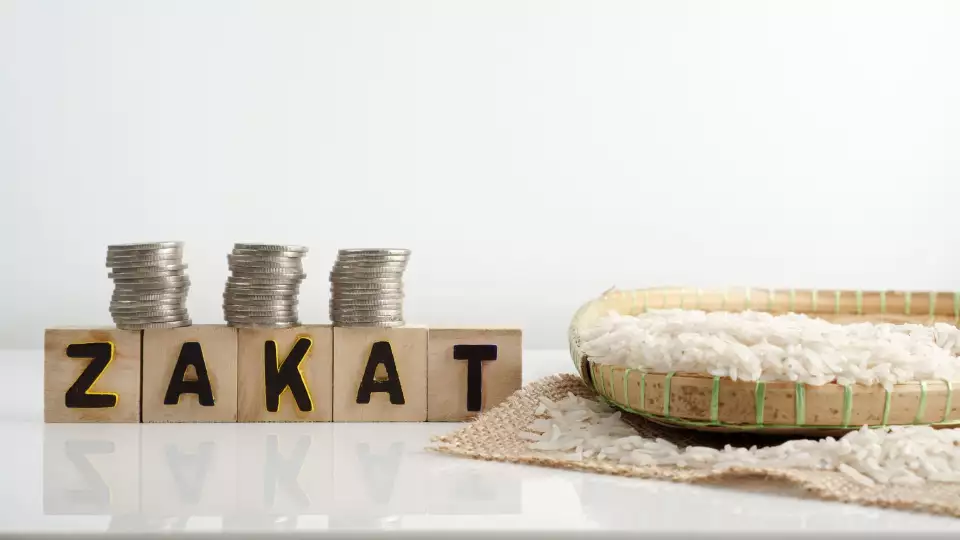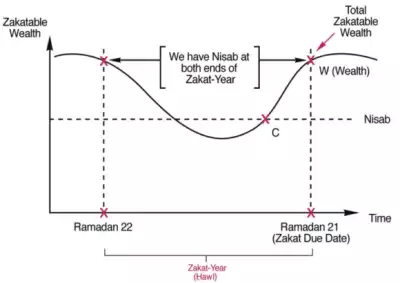
The Short Answer
Zakat, the yearly obligatory alms on the wealth of Muslims, comes due once a lunar year (called a hawl) on the profit, or potential of it, from eligible wealth.
There are two general categories of Zakat-qualified (“Zakatable”) wealth, with two distinct Zakat payment times (see What Requirements Qualify Wealth for Zakat?):
GROWTH WEALTH: money, business assets, and livestock. One pays Zakat on these wealth-types after 12 full lunar months (354 days) passes on one’s full ownership of them, counting from the date of acquisition (separately) of each.
EARTH YIELD / WINDFALLS: Zakat comes due on crops, honey, and such produce, as well as extracted minerals and discovered treasure, at the time of their harvest.
Why do these kinds of wealth separate Zakat Due Dates (ZDD)?
The difference between these assets in their Zakat payment time is this:
Growth wealth – currency (including gold, silver, etc.), trade goods, and cattle “grow” wealth or store it. So one pays Zakat out of their profit (or potential) and the income they create.
Crops, earth extracts, and troves are themselves the growth and income. So one pays Zakat from them.
Who established the timing of Zakat payment?
The Companions of the Prophet, on him be peace, including each of the four Rightly Guided Caliphs, commonly paid and collected Zakat on these due-date conditions. This means they learned it from the Prophet, on him be peace, and there are reliable reports from the Companions on Zakat’s span. (This is generally how the directives of revelation are imparted to people. God prescribes. The Prophet details, on him be peace.) Muslim jurists have fourteen centuries of near consensus on Zakat’s due times (yearly or at harvest).
Of this, renowned 14th-century Syrian scholar Ibn Al-Qayyim says:
[The Prophet, on him be peace] obliged Zakat [on growth assets] yearly, setting its payment time on crops and fruits at their ripening and reaping. Zakat evinces utmost justice in this: due weekly or monthly, wealth-holders would bear a depleting burden; once a lifetime, and it would fail to suffice the needful poor. Its yearly due time serves [justice] best. (Zad Al-Ma‘ad)
Scholars both of prophetic tradition and law agree that no report claims the Prophet, on him be peace, collected Zakat on any kind of wealth more or less often than annually. The lunar year (hawl) constitutes the natural cycle of wealth growth (Fiqh az-Zakat).
Is the Zakat Due Date (ZDD) flexible?
No. On the first type of wealth — growth assets — the passing of a complete 12 months of the hijri calendar, the Islamic lunar year (hawl), occasions one’s Zakat due date on the what one fully owns of it. This is a hard (as in inflexible) deadline.
One can pay Zakat in advance of it (even by years) according to estimate (and then reconcile any shortfall at the actual ZDD), but one cannot miss it without incurring sin. (see Can Zakat Be Delayed or Advanced?)
What starts one’s Zakat year?
One calculates a hawl (Zakat year) from whatever date one’s Zakatable wealth reaches the “minimum threshold” of nisab for that type of wealth until an entire 12 hijri months pass. The Arabic word ‘nisab,’ literally ‘origin,’ or ‘beginning,’ is called this because the right of the poor in a Muslim’s Zakatable wealth “originates” or “begins” at the point where it reaches nisab after a lunar year (hawl) passes on it. (For more on nisab and Zakat calculation see Nisab and Zakat Calculation in a Nutshell. For an extensive explanation see How Is Zakat Calculated on Wealth?)

Do nisab changes effect ZDD?
Yes. Wealth fluctuations (below and then back above) nisab over the course of the year restart the Zakat year count (hawl) for three of the four most followed schools of Islamic Law (Maliki, Shafi‘i, and Hanbali). That is, if one’s wealth during the Zakat year falls below nisab, they restart the hawl count when that wealth-type again reaches nisab.
For the Hanafi school, fluctuations of Zakatable wealth below nisab, once reached, have no impact on one’s Zakat calendar, as long as one possesses the nisab amount at the beginning of the Zakat year (hawl) and on its due date (ZDD).
Here is a graph that illustrates the Hanafi position on nisab mandating Zakat payment over the course of a year (the dates are arbitrary). Interim fluctuations below the nisab threshold do not effect Zakat’s payment at its due date, ‘W.’ In this graph, ‘C’ marks the point where the other schools would restart counting the Zakat year because one’s wealth has fallen below, and then risen back up to, the Zakat threshold (nisab).
(see Can Zakat Be Used to Pay Debt?)
Are there different ZDDs for profit on principal during the Zakat year?
No. Whatever profits or gain comes from one’s principal wealth during that Zakat year gets added to that principal for the purposes of calculating Zakat payment. The principal’s same original due date remains in place. One does not start another lunar year on these additional assets, be it profits or birth from livestock, even if it comes the day before the due date.
Can different kinds wealth have different ZDD?
Yes. If one receives a different kind of Zakatable wealth (say gold as personal wealth, as differentiated from one’s trade goods or business properties), most scholars say that one starts a new calculation of a year for the newly acquired, different wealth type’s ZDD (Gold is the different wealth-type in our hypothetical). Some scholars hold that one should pay Zakat on it upon receipt, or add it to one’s Zakat payment if one has an established Zakat accounting year.
But do not become confused. One would still add newly acquired gold, for example, to one’s other existing personal wealth for the purposes of Zakat calculation and ZDD payment. It is only when one gains a totally new wealth-type (say, one buys 50 sheep, or 30 cows, not owning any of them at the time) that one begins a new ZDD for that different wealth-type.
Can the same kinds of wealth be added together for the same ZDD for Ease?
Yes. If one takes possession of a new asset that is the same as an existing kind of wealth one has — adding gold to your gold, or sheep to your sheep — the Hanafis and Malikis hold that one adds it to the existing wealth and pays Zakat on it at that existing wealth’s ZDD because it is less liable to create confusion. It is easier and the Shari’ah goes with ease. Shafi‘is and Hanbalis say one can start a new Zakat-year (hawl) calculation on newly acquired wealth.
Can Zakat on harvest and minerals be paid at the same ZDD as other wealth?
No. For gains from the earth, one pays Zakat upon receipt, at time of harvest or extraction, as stated previously. One’s increase is immediate. So must one’s Zakat be. Obviously, some wealth yields are also perishable. (see Is Zakat Due on All Wealth? for more on this.)
Are there incentives for paying Zakat on time?
Yes. Here are three.
AVOIDING SIN, HELPING OTHERS
Zakat is both an obligation of divine worship (in the legal category of ‘ibadat), as the Third of the Five Pillars upholding Islam, and a transactional financial duty owed to the poor and deserving (in the legal category of mu‘amalat).
While Zakat’s dual nature causes most of the scholarly differences about its rulings, it also serves to strengthen the prohibition against delaying Zakat’s payment beyond its due date.
As a duty of worship, its obligation is time-delimited like all Islami’s rites of worship – fasting Ramadan, the salat-prayers, and Hajj-pilgrimage (three other of Islam’s Five Pillars). When their due time approaches, these rites become imminent obligations. To miss them is to sin and fall into divine debt that requires fulfillment.
As a financial duty, Zakat postponed usurps the wealth of its divinely appointed real owners, the poor, needful, and deserving.
THE RIGHTOUS DEED IS IMMEIDATE
Allah exhorts us: Race one another to good works (Surat Al-Baqarah, 2:148), and race one another to the forgiveness of your Lord – and to a Garden whose breadth is as the breadth of all heaven and earth (Surat Al-Hadid, 57:21).
None, but Allah knows future bars on one’s capacity, including time of death. Allah and the Prophet, on him be peace, repatedly tell the believer, do while you can; give while you have.
This applies most urgently to Zakat (and to sadaqah, voluntary charity) since it aims to relieve the poor, afflicted, and deserving.
UNPAID ZAKAT TAINTS WEALTH
The Prophet, on him be peace, said: “A person’s obligatory alms does not remain mixed with his other wealth without obliterating it” (Bukhari, Tarikh Al-Kabir, The Large History of Hadith Narrators).
Is Ramadan the best time to pay Zakat?
Yes, but it is not required. (see Is Ramadan the Best Time to Pay Zakat?)
Zakat Al-Fitr, the “Zakat of Fast-Breaking,” is universally obliged on all Muslims in Ramadan. (see Zakat Al-Fitr)
All deeds multiply in Ramadan, including Zakat and sadaqah. Just $1 given in Ramadan, on Laylat Al-Qadr, equals at least $30,000, if we use its thousand-month multiplier: The Night of Empowering Decree is better than a thousand months! (Sûrat Al-Qadr, 97:3).
For this reason, the third Caliph ‘Uthman ibn ‘Affan, God be pleased with him, encouraged this. He said of Ramadan: “Here is the month for you to pay your Zakat. If you have debts, then pay them [now] so that you can sort out your wealth and take Zakat from it” (Malik’s Muwatta).
Yet urgent need – starvation, epidemics, displacement and injury from war and disaster – or imbalances in seasonal charitable giving – can make one’s Zakat payment at other times better than in Ramadan.
To calculate your Zakat payment today, use our Zakat calculator or learn more with our Zakat Handbook






